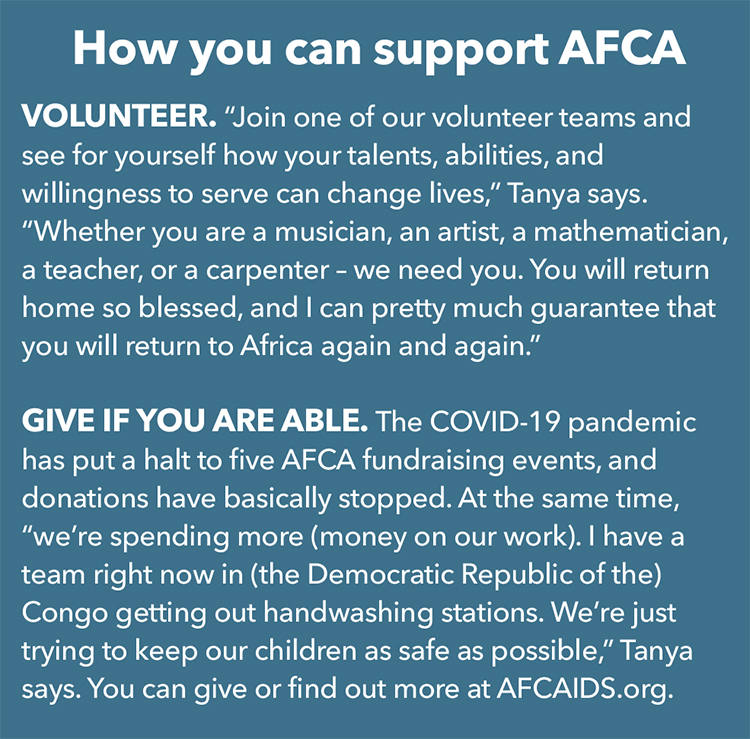By KATIE EUBANKS and DAVID SPRAYBERRY
Fighting AIDS in Africa, one child at a time
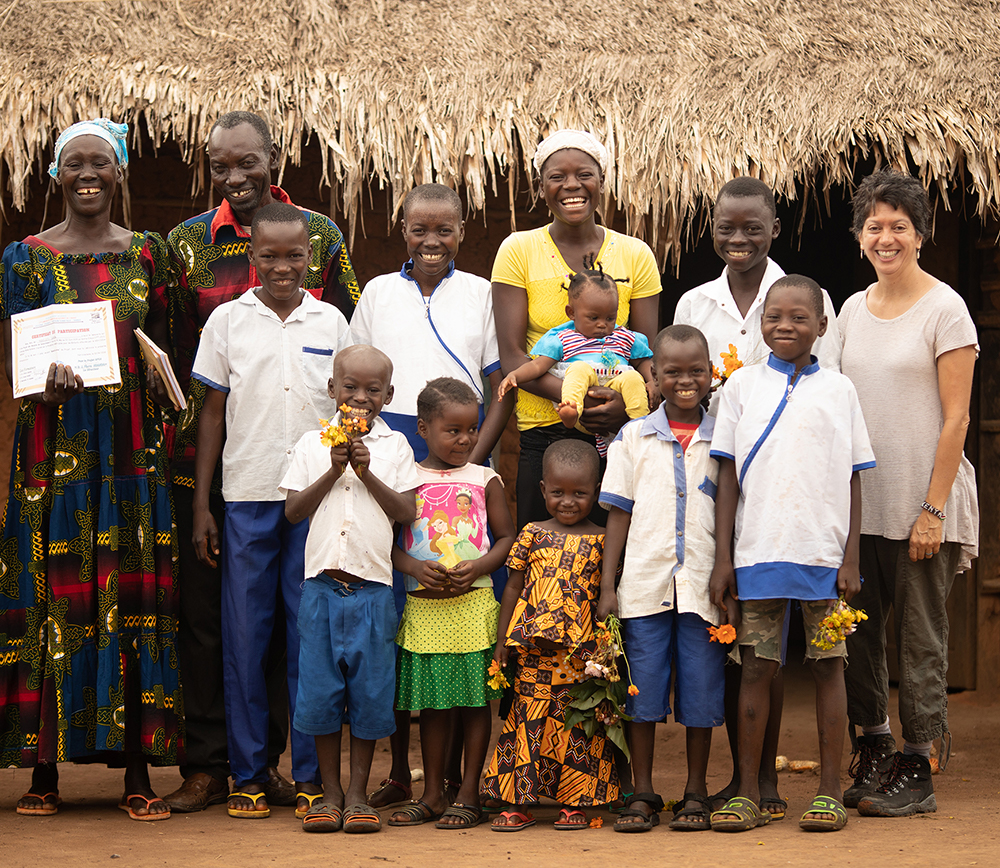
Tanya with a family in the Congo who received a water filter, a solar lamp, three pregnant sheep, gardening tools, and seeds for a family garden and eggplant crop.
“The electricity suddenly went off in the hospital. We were left in the dark and had to do a cesarean birth by flashlight.
“The mother, who was HIV positive, was more worried that her baby would test positive. Once her baby was born, we immediately tested him.
“When I found out the results, I leaned over and whispered, ‘He is negative’ as I placed the baby on her chest. She gripped my hand, and with tears in her eyes said, ‘Thank you, oh, thank you’ over and over again.
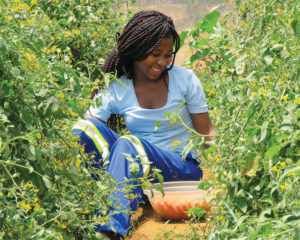
A girl works in one of AFCA’s greenhouses in Zimbabwe.
“The medicine we had provided, plus the cesarean birth, had given her baby a chance of living without the virus. That moment showed me again how important our work is in Africa. One child that day was born free of HIV because of what we do.”
This is one of many stories from Belhaven University alumnus Tanya Weaver, who is fighting the HIV/AIDS epidemic in Africa as executive director of American Foundation for Children with AIDS (AFCA), a nonprofit providing critical comprehensive services to infected and affected HIV-positive children and their caregivers.
Tanya is the only full-time staffer, which means her responsibilities encompass everything from program management, logistics and fundraising to graphic design, marketing and administration.
She was asked to join the charity 15 years ago, when she was seven months pregnant with her first child, Julia.
“My husband and I had been working in Afghanistan,” Tanya says. “We had pulled out a map and were praying over where this child was going to be born. … I didn’t want her to be born in a war zone.”
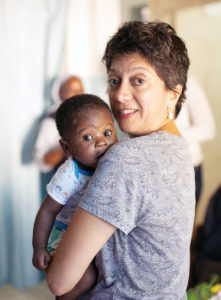
This baby boy was handed to Tanya, who was asked to be his mother. If Kenyan adoption laws had allowed it, she would have.
“(We thought), ‘Ah, Switzerland. That sounds good!’” she jokes. “Then this call came through, which is really strange to get a call in Kabul, because it didn’t happen often. It was from a lady for whom I had translated in the past.
“She said, ‘Hey, what are you going to do when you have that baby?’ I said, ‘I don’t know.’ She said, ‘Do you want to save some children’s lives?’
“I was like (wailing), ‘That’s not fair!’ My hormonal big-bellied self … Of course I wanted to do that.”
Tanya learned she could be based in America and raise her child at home while working for AFCA. “That was one of the things we had prayed specifically about,” she says.
“Salary didn’t matter. How much work it would be — that was inconsequential, really. Because we just felt like this was something that had to be done.
“It’s one of those cool things of never having to be in doubt about whether God will provide, even at the last moment, because you know you’re in His will. The Bible clearly says to provide for the orphan and the widow. So all I have to do is claim His promises.”
After all, Tanya grew up watching her parents do the very same thing.
From Connecticut to South America — and Mississippi
Tanya spent the first six years of her life in a little beach house in Connecticut, where her father was an IBM programmer and her mother was a homemaker, selling Amway on the side.
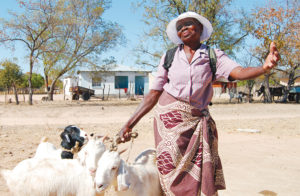
Grandma J is a widow raising five AIDS orphans in Zimbabwe. The children will inherit her goats, provided by the AFCA, when Grandma passes away.
Then the family moved to Colombia, South America. Tanya’s parents ran a World Vision orphanage, and later her father became a pastor and helped establish a church in the capital city of Bogotá.
“They were probably the kindest people you’ve ever met, the most giving people, the most Christlike people, to give up their American dream to just go and help others. Watching them take in orphans who were left in a field or at the door of a hospital … it changes your perspective as a kid,” Tanya says.
Every four years, the family would go home on furlough. Then when Tanya was 17, she enrolled at Belhaven University and moved to Jackson.
“I experienced such kindness. My art teacher was Jon Whittington, and he took me under his wing. All the ladies in the cafeteria … would take me to their homes all over Mississippi,” Tanya says.
“My parents stayed in Colombia, and the rest of my family was all in Connecticut … I didn’t have a car …. And I was 17, so I had to have a guardian ad litem. I was too young to even do anything on my own.
“Roommates would take me home for the holidays. I became friends with a lot of the faculty. … They really gave me a home.”
Fighting AIDS and providing livelihoods
Ninety-one percent of all HIV-positive children, and 69 percent of all HIV-positive people, live in Africa.
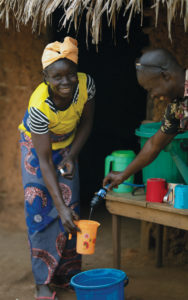
Residents use an AFCA water filter in Gemena, DR Congo.
Recent statistics estimated that 50 percent of children with HIV/AIDS, if untreated, were dying by age 2, and 75 percent by age 5.
“Our friends in Mombasa, Kenya had no medicine to give children when we first met them in 2004. At the time, they were losing 97 percent of the children that came to them for care, not because of lack of training, but because of lack of medicine,” Tanya says.
“They washed them, they comforted them, they held them, and they watched them die.”
In best-case scenarios, AIDS treatment for children went something like this: “weighing a baby, taking an adult pill and breaking it, smashing it, and trying to get a dosage that wouldn’t hurt the baby.”
The AFCA formed a board of directors, and became a charity March 2004. They joined the World Health Organization and Doctors Without Borders. They immediately got involved sourcing medicine and delivering it free of charge to accredited clinics and hospitals in Uganda and Kenya. Their programs then grew to include Zimbabwe and the Democratic Republic of the Congo.
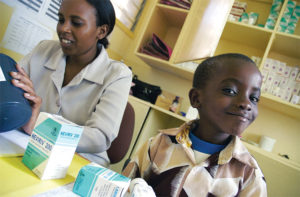
A young boy receives treatment in Mombasa, Kenya.
“Now our friends in Mombasa say that the trend has completely reversed — 97 percent of the children who come to them for treatment are doing well!” Tanya says.
AFCA provides antiretroviral medications for people with AIDS. In layman’s terms, these medications repress HIV until it’s sometimes nearly undetectable. “It will always exist in the body, but it will no longer make the person ill,” she says.
In addition, AFCA provides medicine to fight opportunistic infections, which target people with AIDS because of their compromised immune systems.
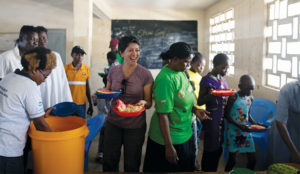
Tanya, center, at lunch at a clinic in Mombasa.
What started as an initial response to HIV/AIDS led to other programs as well. AFCA noticed famines would hit an area where they were working, and children would go hungry, unable to take their medicine.
In times of famine and drought, AFCA provides fortified porridge for the neediest of children. That program led to agriculture training, greenhouses, livestock and garden projects, and seed and livestock distributions — all promoting self-reliance and sustainability, “with the educational support they need to thrive,” Tanya says.
Since 2005, in collaboration with in-country partners, AFCA has served tens of thousands of families in some of the most underserved communities in Africa.
Naming goats and eating worms
This year, Tanya will spend probably four and a half months total in Africa. Usually it’s about three months, but AFCA is starting a new project in the north of DR Congo — so as soon as the border opens back up, she’ll be going back.
She and her husband, Eric, are also waiting to see if they can spend a year in Zimbabwe. They just need approval from his job — he’s a technical advisor for housing with the Christian humanitarian aid organization Samaritan’s Purse.
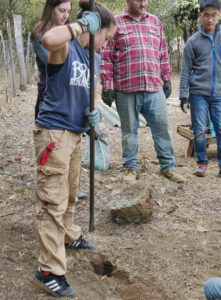
Tanya’s daughter Julia, aka Juju, digging to set up a goat pen in Zimbabwe.
Tanya started taking their two children to Africa when they were very young. She has kept them away from certain locations for safety, “but to remove them from a place because it might be poor, or because it might be different, is not fair,” she says. She also talked with a pediatrician early on and got his advice on everything from bandage brands to malaria meds.
At 3 years old, Tanya’s son, Aiden, would get in line for breakfast and a bath at a Zimbabwean orphanage. He loved the snacks there. Another time, Tanya couldn’t find him. She asked somebody, “Where’s Otieno (the name locals had given Aiden)?”
“Oh, he’s down in the clinic,” the person replied. “He’s learning how to do malaria testing.” Aiden wound up testing his own sister for malaria (with a doctor’s supervision).
Aiden, now 11, and Julia, 14, have tagged and named goats, built goat pens and rabbit hutches, and trained local residents on how to nourish rabbits; they’ve painted schools, held babies, worked at greenhouses, orphanages and fundraisers; they’ve been part of sewing projects. Julia, nicknamed Juju by her family, has learned how to kill a chicken and make a fire. Both kids know how to lay bricks.
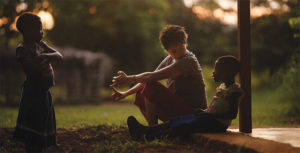
Tanya’s daughter, Julia (aka Juju), learning the Lingala language in the Democratic Republic of the Congo.
But lest you think Tanya takes them over there just to work, “they play a lot,” she says.
“Whenever I take kids to Africa on volunteer teams, I always ask the kids to play part of the day and work part of the day. I really feel like part of their job in being there is to learn that children are the same wherever they are. So they spend a lot of time climbing rocks, climbing trees, riding bikes, running around.”
When in Africa, Julia and Aiden both love eating sadza, which goes by various names depending on where you are, and which Tanya describes as corn mush eaten with either vegetables or stew on the side.
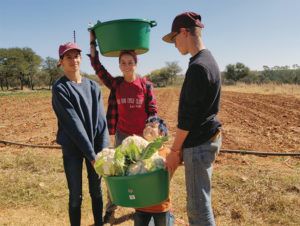
Tanya’s kids, Julia (center, standing) and Aiden (center, kneeling), working on an AFCA farm with friends.
Also, “my son loves mopane (pronounced moh-PAWN-ee) worms,” she says. “I’ve had to cook them for him.” (Think very large caterpillars.)
Tanya has asked her kids if she’s “ruined their lives” by uprooting them for months at a time, but they’ve told her “the opposite has been true,” she says.
“They’re richer for it. They can be so much more grateful for what they have on either continent. In my opinion, we would be doing them a disservice to not allow them to experience this while I go and come back.
“I am a better mother when I can show them what life is and we can talk through it.”
